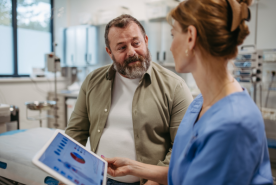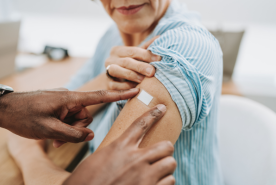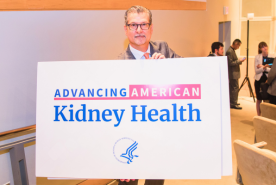Last updated: October 21, 2025
Medically reviewed by: NKF Patient Education Team
Vaccine information designed for adults (19 years or older) with advanced stages of chronic kidney disease, on dialysis, or kidney transplants.
NKF will continue to be a clear and trusted resource for information on the impact of vaccination policy for people living with kidney diseases. Years of evidence have shown vaccines to be safe and effective. They are crucial to the health and survival of patients with kidney disease, many of whom are immunosuppressed.
About vaccines
Vaccines help your body fight off diseases like the flu, tetanus, hepatitis B, COVID-19, shingles, and pneumonia. Getting vaccinated can keep you from getting very sick if you do catch one of these illnesses.
Some diseases can spread from person to person. When more people get vaccinated, it helps protect everyone – especially those who are more likely to get very sick, such as older adults, children, and people with long-term health problems.
Uses
Vaccines are very important for people with chronic kidney disease (CKD), those who are on dialysis, and people who have a weakened immune system (immunosuppressed), such as kidney transplant recipients. Vaccines can help prevent serious infections and keep you healthier.
How they work
Vaccines help protect you from certain diseases by teaching your body how to fight them. They do this by acting like a mild “practice” infection. This helps your immune system learn what to do if you are exposed to the real disease later.
It can take a few weeks after getting a vaccine for your body to be fully protected. That’s why someone might still get sick right before or just after getting a vaccine – your body hasn’t had time to build up full immunity (protection) yet. Even if you do get the disease, being vaccinated usually means you won’t get as sick.
Some vaccines need more than one dose to work best or keep working over time:
- Multi-dose vaccines: Some vaccines work better after two or more doses. For example, the shingles vaccine needs a second dose a few months after the first one.
- Boosters: Over time, protection from some vaccines can fade. A booster helps “remind” your immune system how to fight the disease, so it is always ready. For example, adults need a tetanus booster every 10 years.
- Yearly: Some viruses change often, so new vaccines are made each year to match them. The flu shot is a good example – it is updated every year to protect against the flu strains that are spreading the most each winter.
Types
Scientists use different methods to make vaccines. The one they choose depends on what they know about the disease it is designed for, like how the germ infects people, how the immune system reacts, where the germ is found, and what kind of germ (or “strain”) it is.
According to the CDC, there are several main types of vaccines used in the United States:
Live, attenuated (weakened) vaccines
These vaccines contain a tiny amount of the real virus or bacteria, but it has been weakened so it cannot cause serious illness in people with a healthy immune system. Because these vaccines are similar to a real infection, they help the immune system learn how to fight the germ.
People who have received a kidney transplant should not get live vaccines. When possible, household members of people with a kidney transplant should also avoid the nasal flu, oral polio, and smallpox vaccines (other live vaccines are less likely to spread to someone with a weak immune system).
Examples include:
- Nasal flu vaccine (nose spray) – use the injection version instead
- Chickenpox (varicella) vaccine
- Measles, mumps, rubella (MMR) vaccine
- Yellow fever vaccine
Inactivated (non-live) vaccines
These vaccines are made from germs that have been killed or stopped so they cannot cause infection. Even though the germ is dead, the vaccine still trains your immune system to recognize and attack it in the future. You often need more than one dose to build and keep your protection strong.
Examples include:
- Inactivated flu vaccine (injection)
- Inactivated polio vaccine (injection)
- Hepatitis A vaccine
Messenger RNA (mRNA) vaccines:
These vaccines give the body instructions to make a tiny, harmless piece of the germ. This teaches your immune system how to recognize and fight it. Because mRNA vaccines only have instructions for a small piece of the germ, they cannot cause the infection they protect against. They also cannot change your DNA or the genes in your body.
Examples include:
- Moderna COVID-19 vaccine
- Pfizer-BioNtech COVID-19 vaccine
Subunit, recombinant, polysaccharide, and conjugate vaccines
These vaccines use only parts of the virus or bacteria, not the whole germ. They train the immune system to find and attack those specific parts quickly.
Examples include:
- Hepatitis B vaccine
- Pneumococcal (pneumonia) vaccines
- HPV vaccine
- Shingles vaccine
- Novavax COVID-19 vaccine
Toxoid vaccines
Some bacteria cause illness by making toxins (poisons). Toxoid vaccines are made from these toxins after they are weakened so they cannot make you sick. The immune system learns to recognize and fight the toxin if it appears later. The most common example is the tetanus vaccine.
If you have a weakened immune system, such as after a kidney transplant, do not get live vaccines. Always talk with your healthcare team before getting any vaccine to make sure it is safe for you.
Effectiveness
Vaccines are one of the best ways to keep you healthy. They help your body prepare to fight off germs that can cause diseases like the flu, hepatitis B, pneumonia, or polio.
A vaccine may not always stop you from getting an infection. But if you do get sick, the vaccine helps your body fight it faster and helps keep you from getting very sick. The goal is to help your immune system work quickly and protect you from serious illness – such as needing hospital care, ICU (intensive care unit) care, or even dying from the infection. In other words, vaccines can offer the best possible protection against the worst effects of certain infections.
After getting a vaccine, your body needs time to build protection:
- For vaccines that only need one dose, your body is usually protected within a few weeks.
- For vaccines that need more than one dose, you only get part of the protection after the first dose. You’ll get the strongest protection a few weeks after your last dose in the series. So, it is important to get all doses on schedule. Skipping or delaying doses can make the vaccine less effective.
How well a vaccine works depends on your immune system. People with a weakened immune system are more likely to get seriously ill from infections. However, their immune system also may not respond as strongly to vaccines. This is why people with weaker immune systems may need extra doses or higher doses of certain vaccines to stay protected.
Your immune system may be weaker if you:
- are over 65 years old
- have been on dialysis for a long time
- are getting chemotherapy
- take anti-rejection medicines, such as after kidney or other organ transplant
- are taking medicine for glomerular disease (like IgA nephropathy, C3G disease, or lupus nephritis) that “calms” the immune system
Not everyone’s immune system is weakened in the same way. Some people have a slightly lower immune response, while others have very little immune protection.
Side effects
Like any medicine, vaccines can cause side effects. Most side effects are mild and short-term. Common side effects include:
- soreness or redness where you got the vaccine
- mild rash
- low fever
- headache
- feeling tired
These mild side effects are normal and mean your body is learning how to fight the germ and building protection.
Serious side effects are very rare. Call 911 or go to the hospital if you have:
- hives or swelling of your face or throat
- fast heartbeat
- dizziness or weakness
- trouble breathing
- tingling or weakness in your legs, arms or face (potential signs of a rare nerve condition called Guillain-Barré Syndrome).
If you have had a serious reaction to one vaccine, it may increase your risk of reacting to another one – but not always.
Extensive research has definitively shown there is no link between vaccines and autism.
If you believe you were seriously hurt by a vaccine, you may be able to get help from the National Vaccine Injury Compensation Program (VICP). Not all vaccines are covered by this program.
COVID-19 and myocarditis/pericarditis
In very rare cases, some people have had myocarditis (swelling of the heart muscle) or pericarditis (swelling of the lining around the heart) after getting a COVID-19 vaccine in the United States. The CDC and Advisory Committee on Immunization Practices (ACIP) continue to emphasize that the benefits of getting vaccinated are much greater than the small risk of these heart problems. The vaccine helps prevent serious illness, hospital stays, and death caused by COVID-19, including heart problems that can happen from the virus itself.
These side effects are rare, but people (especially males age 12-39) should know what symptoms to look for after vaccination. Call your doctor or get medical help right away if you notice:
- chest pain
- shortness of breath
- fast or pounding heartbeat
If these symptoms happen, they usually appear within one week after COVID-19 vaccination.
Vaccines are a safe and effective way to protect against serious infections. Getting sick naturally can be much more dangerous – even for illnesses that seem mild. Since no one can predict who will get very sick from an infection, vaccines are the best way to protect yourself and the people you care about.
Recommended vaccines for adults
If you’re an adult (age 19 or older) with chronic kidney disease, on dialysis, or have had a kidney transplant, it’s important to know which vaccines are safe and recommended for you. Always talk with a healthcare professional about risks and benefits to you before getting a vaccine.
Be sure to tell the vaccine provider if you:
- are on dialysis
- have had a kidney or other organ transplant
- have ever had a serious reaction to a vaccine
The information below lists the vaccines that most adults with kidney disease may need, based on CDC (Centers for Disease Control and Prevention) guidance as of October 2025.
Reference to specific commercial products, manufacturers, companies, or trademarks does not constitute its endorsement or recommendation by the US Government, Department of Health and Human Services, or Centers for Disease Control and Prevention.
Additional considerations
Finding vaccines
Talk with your healthcare team first to learn which vaccines are recommended for you. You can usually get vaccines at:
- the clinic where you receive your regular medical care
- your local pharmacy
- your public health department
Some local health agencies or hospitals also hold special vaccine clinics during the year.
Cost of vaccines
The cost of vaccines can vary, but most are covered by health insurance.
- Local health departments may offer vaccines for free or at a low cost.
- Medicare Part B covers the flu, pneumonia, COVID-19, and hepatitis B vaccines (a small copay may apply).
- Medicare Part D covers the shingles, RSV and tetanus vaccines without a deductible or cost-sharing.
In some states, you may need a prescription from your healthcare provider to get a vaccine at a pharmacy or have the vaccine cost covered by your insurance.
Shingles (herpes zoster) vaccine
If you received a kidney or other organ transplant a few years ago, you may have been told not to get the shingles vaccine. That’s because the original shingles vaccine was a live vaccine, which was not safe for people with weakened immune systems.
A newer, inactivated version of the shingles vaccine is now available. This means people who have received a kidney or other transplant can safely get it. Because anti-rejection medicines after a transplant weaken your immune system, you have a very high risk of getting shingles. This is why experts recommend that people who have received an organ transplant get the new inactivated shingles vaccine for added protection.
Questions for your healthcare team
- Which vaccines should I get because of my kidney disease?
- Do I need any other vaccines based on my other health conditions or risks?
- If I already got the pneumonia vaccine, do I need the newer one?
- Where can I find trustworthy information about vaccines?
- [If on dialysis or taking anti-rejection medicines] Do I need extra doses or higher doses of any vaccines?








